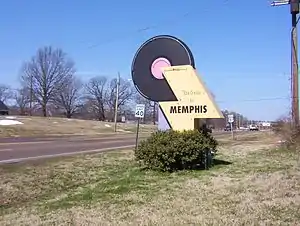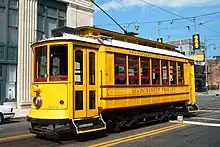Graceland | |
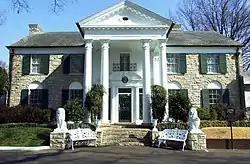 Graceland Mansion | |
Interactive map showing Graceland's location | |
| Location | 3764 Elvis Presley Boulevard (Highway 51 South), Memphis, Tennessee, U.S. |
|---|---|
| Coordinates | 35°2′45.4″N 90°1′22.6″W / 35.045944°N 90.022944°W |
| Area | 14 acres (5.7 ha)[1] |
| Built | 1939 |
| Architect | Furbringer and Ehrman |
| Architectural style | Colonial Revival[2] |
| NRHP reference No. | 91001585 |
| Significant dates | |
| Added to NRHP | November 7, 1991[3] |
| Designated NHL | March 27, 2006[4] |
Graceland is a mansion on a 13.8-acre (5.6-hectare) estate in Memphis, Tennessee, United States, once owned by American singer Elvis Presley. Presley is buried there, as are his parents, paternal grandmother, grandson, and daughter.
Graceland is located at 3764 Elvis Presley Boulevard in the Whitehaven, Memphis neighborhood, about nine miles (14 kilometres) south of central Memphis and fewer than four miles (6.4 km) north of the Mississippi border.[5] It was opened to the public as a house museum on June 7, 1982, and attracts more than 650,000 visitors annually.[6]
Graceland was listed in the National Register of Historic Places on November 7, 1991, becoming the first site recognized for significance related to rock music. It was declared a National Historic Landmark on March 27, 2006, also a first for such a site.
Elvis' father, Vernon, first inherited Graceland after his death on August 16, 1977. Lisa Marie Presley inherited Graceland after she turned 25 years old, according to a document which named Elvis's ex-wife, Priscilla Presley, as trustee. Following Lisa Marie's death on January 12, 2023, her eldest daughter, Riley Keough, became the sole trustee and owner.[7]
History
Graceland Farms was originally owned by Stephen C. Toof, founder of S.C. Toof & Co., the oldest commercial printing firm in Memphis. He worked previously as the pressroom foreman of the Memphis newspaper, the Memphis Daily Appeal. The site (before the mansion was built in 1939) was named after Toof's daughter, Grace. She inherited the property from her father in 1894. After her death, the property passed to her niece Ruth Moore, a Memphis socialite. Together with her husband, Thomas Moore, Ruth Moore commissioned construction of a 10,266-square-foot (953.7 m2) Colonial Revival style mansion in 1939.[8] The house was designed by architects Furbringer and Ehrman.[9]
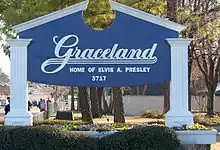
After Elvis Presley began his musical career, he purchased a $40,000 home for himself and his family at 1034 Audubon Drive in Memphis.[10] As his success and fame grew, especially after his appearances on television, the number of fans who would congregate outside the house increased.[10] Presley's neighbors, although happy to have a celebrity living nearby, concluded that the constant gathering of fans and journalists was a nuisance.[10]
In early 1957, Presley gave his parents, Vernon and Gladys Presley, a budget of $100,000 and asked them to find a "farmhouse"-like property to purchase, with buffer space around it.[11] At the time, Graceland was located in southern Shelby County, several miles south of Memphis's main urban area.[11] In later years, Memphis expanded with residential developments, resulting in Graceland being surrounded by other properties.[11] Presley purchased Graceland on March 19, 1957, for a price of $102,500.[12]
Later that year, Presley invited Richard Williams and singer Buzz Cason to the house. Cason said: "We proceeded to clown around on the front porch, striking our best rock 'n' roll poses and snapping pictures with the little camera. We peeked in the not-yet-curtained windows and got a kick out of the pastel colored walls in the front rooms with shades of bright reds and purples that Elvis most certainly had picked out."[13] Presley was fond of claiming that the US government had mooted a visit to Graceland by Nikita Khrushchev of the Soviet Union, "to see how in America a fellow can start out with nothing and, you know, make good."[14]
After Gladys died in 1958 aged 46, Presley's father Vernon married Dee Stanley in 1960, and the couple lived at Graceland for a time. There was some discord between Presley and his stepmother Dee at Graceland, however. Elaine Dundy, who wrote about Presley and his mother, said that
Vernon had settled down with Dee where Gladys had once reigned, while Dee herself – when Elvis was away – had taken over the role of mistress of Graceland so thoroughly as to rearrange the furniture and replace the very curtains that Gladys had approved of." This was too much for Presley, who still loved his late mother deeply. One afternoon, "a van arrived ... and all Dee's household's goods, clothes, 'improvements,' and her own menagerie of pets, were loaded on ... while Vernon, Dee and her three children went by car to a nearby house on Hermitage until they finally settled into a house on Dolan Drive which ran alongside Elvis's estate.[15]
According to Mark Crispin Miller, Graceland became for Presley "the home of the organization that was himself, was tended by a large vague clan of Presleys and deputy Presleys, each squandering the vast gratuities which Elvis used to keep his whole world smiling." The author adds that Presley's father Vernon "had a swimming pool in his bedroom", that there "was a jukebox next to the swimming pool, containing Elvis's favorite records", and that, he "would spend hours in his bedroom, watching his property on a closed-circuit television".[16] According to Presley's cousin, Billy Smith, Presley slept at Graceland with Smith and his wife Jo many times: "we were all three there talking for hours about everything in the world! Sometimes he would have a bad dream and come looking for me to talk to, and he would actually fall asleep in our bed with us."[17]
Priscilla Presley lived at Graceland for five years before she and Elvis married in Las Vegas, Nevada, on May 1, 1967.[18] Their daughter Lisa Marie Presley was born on February 1, 1968, and lived the first years of her life on the estate. After her parents divorced in 1972, her mother moved with Lisa to California. Every year around Christmas, Lisa Marie Presley and all her family would go to Graceland to celebrate Christmas together. Lisa Marie often returned to Graceland for visits.
When Elvis toured, staying in hotels, "the rooms would be remodeled in advance of his arrival, so as to make the same configurations of space as he had at home – the Graceland mansion. His furniture would arrive, and he could unwind after his performances in surroundings which were completely familiar and comforting." 'The Jungle Room' was described as being "an example of particularly lurid kitsch."[19]

On August 16, 1977, Presley died aged 42 in his bathroom at Graceland. According to the biographer Peter Guralnick, he "had thrown up after being stricken, apparently while seated on the toilet. It looked to the medical investigator as if he had 'stumbled or crawled several feet before he died.'" Guralnick adds that "drug use was heavily implicated in this unanticipated death of a middle-aged man with no known history of heart disease."[20] The official cause of death was cardiac arrhythmia, although later toxicology reports strongly suggested that polypharmacy was the primary cause of death; "fourteen drugs were found in Elvis's system, with several drugs such as codeine in significant quantities.[21] Presley lay in repose in a 900-pound (410 kg), copper-lined coffin just inside the foyer; more than 3,500 of his mourning fans passed by to pay their respects. A private funeral with 200 mourners was held on August 18, 1977, in the house, with the casket placed in front of the stained glass doorway of the music room. Graceland continued to be occupied by members of the family until the death of Presley's aunt Delta in 1993, who had moved in at Elvis's invitation after her husband's death.[22] Elvis's daughter, Lisa Marie Presley, inherited the estate in 1993 when she turned 25. [23]
Presley's grave, along with those of his parents Gladys and Vernon Presley, his grandmother Minnie Mae Presley, Elvis's daughter, Lisa Marie Presley, and his grandson Benjamin Keough are located in the Meditation Garden next to the mansion. They can be visited during the mansion tours or for free before the mansion tours begin. A memorial gravestone for Presley's stillborn twin brother, Jesse Garon, is also at the site.
In 2019, the owners of Graceland threatened to leave Memphis unless the city provided tax incentives. The Memphis City Council subsequently voted on a deal to help fund a $100 million expansion of Graceland.[24][25]
Architecture
Exterior
Constructed at the top of a hill and surrounded by rolling pastures and a grove of oak trees, Graceland is designed by the Memphis architectural firm, Furbringer and Erhmanis. It's a two-story, five-bay residence in the Colonial Revival style, with a side-facing gabled roof covered in asphalt shingles, a central two-story projecting pedimented portico, and two one-story wings on the north and south sides. Attached to the wing is an additional one-story stuccoed wing, which was originally a garage that houses up to four cars. The mansion has two chimneys; one on the north side's exterior wall, the second rising through the south side's roof ridge. The central block's front and side facades are veneered with tan Tishomingo limestone from Mississippi and its rear wall is stuccoed, as are the one-story wings. The front facade fenestration on the first floor includes 9x9 double-hung windows set in arched openings with wooden panels above, and 6x6 double-hung windows on the second floor.
Flanked by two marble lions, four stone steps ascend from the driveway to the two-story central projecting pedimented portico. The pediment has dentils and a small, leaded oval window in the center while the portico contains four Corinthian columns with capitals modeled after architect James Stuart's conjectural porticos for the "Tower of the Winds" in Athens, Greece.[26] The portico's cornered columns are matched by pilasters on the front facade. The doorway has a broken arched pediment, full entablature, and engaged columns while its transom and sidelights contain elaborate and colorful stained glass. And above the main entrance is another rectangular window, completed with a shallow iron balcony.[27]
Interior
First floor
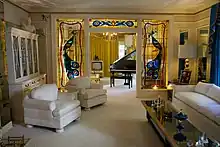
Graceland is 17,552 square feet (1,630.6 m2) and has a total of 23 rooms, including eight bedrooms and bathrooms. To the right of the Entrance Hall, through an elliptical-arched opening with classical details, is the Living Room. The Living Room contains a 15-foot-long (4.6 m) white couch against the wall overlooking the front yard. To the left are two white sofas, a china cabinet and a fireplace with a mirrored wall. The painting that hangs in the room was Elvis's last Christmas present from his father, Vernon, and also displayed are photographs of Elvis's parents Vernon and Gladys, Elvis and Lisa Marie. Behind an adjoined doorway is the Music Room, framed by vivid large peacocks set in stained glass and contains a black baby grand piano and a 1950s style TV. And the third adjacent room is a bedroom that was occupied by Elvis's parents. The walls, carpet, dresser, and queen size bed are bright white with the bed draped in a velvet-looking dark purple bedspread along with an en-suite full bathroom done in pink.
To the left of the Entrance Hall, mirroring the Living Room, is the Dining Room, headlined by a massive crystal chandelier. It features six plush chairs in golden metal frames set around a marble table, all of which are placed on black marble flooring in the center with carpet around the perimeter. Connected to the Dining Room is the Kitchen, which was used by Elvis's aunt Delta until her death in 1993 before it was opened to the public two years later.[28]

The original one-story wing on the north end of the residence includes a mechanical room, bedroom, and bath. In the mid-1960s, Presley enlarged the house to create a den known as the Jungle Room which features an indoor waterfall of cut field stone on the north wall. The room also contains items both related to and imported from the state of Hawaii because, after starring in the tropical film "Blue Hawaii" (1961), the musician wanted to bring some memorabilia from The Aloha State to his mansion, which gives visitors the same feeling. In 1976, the Jungle Room was converted into a recording studio, where he recorded the bulk of his final two albums, From Elvis Presley Boulevard, Memphis, Tennessee (1976) and Moody Blue (1977); these were his final known recordings in a studio setting.[29] During the mid-1960s expansion of the house, Presley constructed a large wing on the south side of the main house that was a sidewalk, between the music room in the original one-story wing and the swimming pool area, that connected to the house by a small enclosed gallery. The new wing initially housed a slot car track and to store his many items of appreciation, but was later remodeled to what is now known as the Trophy Building, which now features an exhibit about the Presley family, and includes Priscilla's wedding dress, Elvis's wedding tuxedo, Lisa Marie's toy chest and baby clothes and more.[30]
Second floor
The Entrance Hall contains a white staircase leading to the house's second floor with a wall of mirrors. However, the second floor is not open to visitors, out of respect for the Presley family, and partially to avoid any improper focus on the bathroom which was the site of his death. Still, it features Elvis's bedroom at the southwest corner that connects to his dressing room and bathroom in the northwest. His daughter Lisa Marie's bedroom is in the northeast corner, and in the southeast is a bedroom that served as a private personal office for the musician.[31] The floor has been untouched since the day Elvis died and is rarely seen by non-family members.[32]
Basement
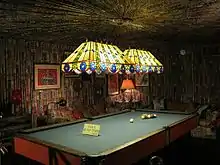
Downstairs in the basement is the TV room, where Elvis often watched three television sets at once, and was within close reach of a wet bar.[33] The three TV sets are built into the room's south wall and there's a stereo, and cabinets for Elvis's record collection. Painted on the west wall is The King's 1970s logo of a lightning bolt and cloud with the initials TCB, both of which represent 'taking care of business in a flash'. And the last room in the mansion opposite of the TV room is the billiard room; an avid billiards player, Elvis bought the pool table in 1960 and had the walls and ceiling covered with 350–400 yards of pleated cotton fabric after the two basement rooms were remodeled in 1974. The pool balls are arranged just the way they were in the musician's final days, along with a sign that says "PLEASE DO NOT TOUCH, THANK YOU." And in one corner of the pool table, there's a rip in the green felt, which was caused by one of Elvis's friends in a failed attempt of a trick shot.
Critical voices
Critics such as Albert Goldman write: "Though it cost a lot of money to fill up Graceland with the things that appealed to Elvis Presley, nothing in the house is worth a dime." In chapter 1 of his book, Elvis (1981), the author describes Graceland as looking like a brothel: "it appears to have been lifted from some turn-of-the-century bordello down in the French Quarter of New Orleans. Lulu White or the Countess Willie Piazza might have contrived this plushy parlor for the entertainment of Gyp the Blood. The room is a gaudy mélange of red velour and gilded tassels, Louis XV furniture and porcelain bric-a-brac..." And he dismisses the interior as "bizarre," "garish" and "phony," adding that "King Elvis's obsession with royal red reaches an intensity that makes you gag."[34]
In similar terms, Greil Marcus writes that people who visited the inside of Graceland—"people who to a real degree shared Elvis Presley’s class background, and whose lives were formed by his music—have returned with one word to describe what they saw: ‘Tacky.’ Tacky, garish, tasteless—words others translated as white trash."[35]
According to Karal Ann Marling, Graceland is "a Technicolor illusion. The façade is Gone With the Wind all the way. The den in the back is Mogambo with a hint of Blue Hawaii. Living in Graceland was like living on a Hollywood backlot, where patches of tropical scenery alternated with the blackened ruins of antebellum Atlanta. It was like living in a Memphis movie theater... Diehard fans are sometimes disappointed by the formal rooms along the highway side of Graceland. They’re beautiful, in a chilly blue-and-white way, but remote and overarranged." The Jungle Room's "overt bad taste" lets nonbelievers "recoil in horror and imagine themselves a notch or two higher than Elvis on the class scale."[36]
Estate
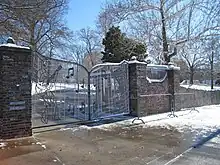
After purchasing the property Presley spent in excess of $500,000 carrying out extensive modifications to suit his needs including a pink Alabama fieldstone wall surrounding the grounds that has several years' worth of graffiti (signatures and messages) from visitors, who simply refer to it as "the wall".[37] Designed and built by Abe Sauer is the wrought-iron front gate shaped like a book of sheet music, along with green colored musical notes and two mirrored silhouettes of Elvis playing his guitar. Sauer also installed a kidney shaped swimming pool and a racquetball court, which is reminiscent of an old country club, furnished in dark leather and a functional bar. There is a sunken sitting area with the ever-present stereo system found throughout Graceland, as well as the dark brown upright piano upon which Elvis played for what were to be his last songs, Willie Nelson's "Blue Eyes Crying in the Rain" and "Unchained Melody".
However, reports conflict about which one was the last song. The sitting area has a floor-to-ceiling shatterproof window designed to watch the many racquetball games that took place there when Elvis was alive. In the early hours of the morning on which Elvis died, he played a game of racquetball with his girlfriend Ginger Alden, his first cousin Billy Smith and Billy's wife Jo before ending the game with the song on the piano before walking into the main house to wash his hair and go to bed. Today the two story court has been restored to the way it was when Elvis used the building.[30]
Elsewhere on the estate is a small white building that served as an office for Vernon, along with an old smokehouse that housed a shooting range and a fully functional stable of horses.
One of Presley's better known modifications was the addition of the Meditation Garden, designed and built by architect Bernard Grenadier. It was used by the musician to reflect on any problems or situations that arose during his life. It is also where his entire family is buried: himself (1935–1977), his parents Gladys (1912–1958) and Vernon (1916–1979), and grandmother Minnie Mae Hood (1890–1980) while a small stone memorializes his twin brother Jesse Garon, who died at birth thirty minutes before Elvis was born on January 8, 1935. In late 2020, Lisa Marie's son Benjamin Keough was laid to rest on the opposite end of the Meditation Garden after his death from suicide in July of that year.[38] Lisa Marie Presley died from sudden cardiac arrest in January 2023 and is buried next to her son.[39]
Tourist destination
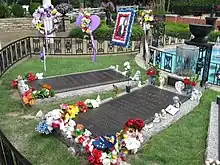
After Elvis Presley's death in 1977, Vernon Presley served as executor of his estate. Upon his death in 1979, he chose Priscilla to serve as the estate executor for Elvis's only child, Lisa Marie, who was only 11. Graceland itself cost $500,000 a year in upkeep, and expenses had dwindled Elvis's and Priscilla's daughter Lisa Marie's inheritance to only $1 million. Taxes were due on the property; those and other expenses due came to over $500,000. Faced with having to sell Graceland, Priscilla examined other famous houses/museums, and hired a CEO, Jack Soden, to turn Graceland into a moneymaker. Graceland was opened to the public on June 7, 1982. Priscilla's gamble paid off; after only a month of opening Graceland's doors the estate made back all the money it had invested. Priscilla Presley became the chairwoman and president of Elvis Presley Enterprises, or EPE, stating at that time she would do so until Lisa Marie reached 21 years of age. The enterprise's fortunes soared and eventually the trust grew to be worth over $100 million.
An annual procession through the estate and past Elvis's grave is held on the anniversary of his death. Known as Elvis Week, it includes a full schedule of speakers and events, including the only Elvis Mass at St. Paul's Church, the highlight for many Elvis fans of all faiths. The 20th Anniversary in 1997 had several hundred media groups from around the world that were present resulting in the event gaining its greatest media publicity.
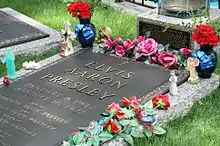
One of the largest gatherings assembled on the 25th anniversary in 2002 with one estimate of 40,000 people in attendance, despite the heavy rain. On the 38th anniversary of Elvis's death, an estimated 30,000 people attended the Candlelight Vigil during the night of August 15–16, 2015.[40] On the 40th anniversary of Elvis's death, on August 15–16, 2017, at least 50,000 fans were expected to attend the Candlelight Vigil. No official figure seems to have been released, maybe because, for the first time, attendees had to pay at least the lowest tour fare, $28.75, to cover the extra security costs due to a larger than usual crowd.[41][42]
For many of the hundreds of thousands of people who visit Graceland each year, the visit takes on a quasi-religious perspective.[43] They may plan for years to journey to the home of the 'King' of rock and roll. On site, headphones narrate the salient events of Elvis's life and introduce the relics that adorn the rooms and corridors. The rhetorical mode is hagiographic, celebrating the life of an extraordinary man, emphasizing his generosity, his kindness and good fellowship, how he was at once a poor boy who made good, an extraordinary musical talent, a sinner and substance abuser, and a religious man devoted to the Gospel and its music. At the meditation garden, containing Elvis's grave, some visitors pray, kneel, or quietly sing one of Elvis's favorite hymns. The brick wall that encloses the mansion's grounds is covered with graffiti that express an admiration for Presley as well as petitions for help and thanks for favors granted.[44]

The Graceland grounds include a new exhibit complex, Elvis Presley's Memphis, which includes a new car museum, Presley Motors, which houses Elvis's Pink Cadillac. The complex features new exhibits and museums, as well as a studio for Sirius Satellite Radio's all-Elvis Presley channel.[45] The service's subscribers all over North America can hear Presley's music from Graceland around the clock. Not far away on display are his two aircraft including Lisa Marie (a Convair 880 jetliner) and Hound Dog II (a Lockheed JetStar business jet). The jets are owned by Graceland and are on permanent static display.[46]
In early August 2005, Lisa Marie Presley sold 85% of the business side of her father's estate. She kept the Graceland property itself, as well as the bulk of the possessions found therein, and she turned over the management of Graceland to CKX, Inc., an entertainment company (on whose board of directors Priscilla Presley sat) that also owns 19 Entertainment, creator of the American Idol TV show.
Graceland Holdings LLC, led by managing partner Joel Weinshanker, is the majority owner of EPE. Lisa Marie Presley's estate retains a 15% ownership in the company.
Lisa Marie Presley's estate, which is being held in trust for her daughters Riley Keough and Harper and Finley Lockwood, retain 100% sole personal ownership of Graceland Mansion itself and its over 13-acre original grounds as well as Elvis Presley's personal effects – including costumes, wardrobe, awards, furniture, cars, etc.[39] Prior to her death in 2023, Lisa Marie Presley had made the mansion property and her father's personal effects permanently available for tours of Graceland and for use in all of EPE's operations.[47]
Notable visitors
According to Elvis Presley's Enterprises, staff at Graceland informally kept a list of celebrities who had visited in the first years following Elvis's death. This practice was not formalized for a decade. Muhammad Ali was an early celebrity visitor in 1978, as was singer Paul Simon. He toured Graceland in the early 80s and afterward wrote a song of the same name; it was the title track of his Grammy-winning album Graceland.
On June 30, 2006, then US President George W. Bush hosted Japanese Prime Minister Junichiro Koizumi for a tour of the mansion. It was one of the few private residences on United States soil to have been the site of an official joint-visit by a sitting US president and a serving head of a foreign government. On August 6, 2010, Prince Albert II, Head of State of the Principality of Monaco, and his fiancée (now Princess of Monaco) Charlene Wittstock, toured Graceland while vacationing in the US.[48] On May 26, 2013, Paul McCartney of The Beatles visited Graceland.[49] Prince William and Prince Harry, while in Memphis for a friend's wedding, visited Graceland on May 2, 2014.[50]
The home has also been visited by former US President Jimmy Carter; the late Duchess of Devonshire, the sitting ambassadors of India, France, China, Korea and Israel to the United States; as well as several US governors, members of the US Congress, and at least two Nobel Prize winners, namely singer-songwriter Bob Dylan, a Literature Prize laureate, and the former President of Costa Rica, Oscar Arias, a Peace Prize honoree, who visited it on October 10, 2001.
In May 2016, Graceland welcomed a newlywed couple as its 20 millionth visitor.[51]
In June 2022, actors Austin Butler and Tom Hanks visited the mansion and were interviewed virtually by the Good Morning America news program from the Jungle Room to talk about their biographical film Elvis.
Graceland in pop culture
- Paul Simon named an album Graceland, as well as its title track. The song won the Grammy Award for Record of the Year in 1987.
- The song "Walking in Memphis" by Marc Cohn mentions Graceland; in the second verse, he refers to the mansion and the Jungle Room. This song was later covered by Cher and Lonestar, among others.
- The film 3000 Miles to Graceland is about a group of criminals who plan to rob a casino during an international Elvis week, disguised as Elvis impersonators. No scenes take place at or near the estate.
- The film Finding Graceland stars Harvey Keitel with Johnathon Schaech. Keitel is an impersonator who claims to be the real Elvis after Schaech picks him up as a hitch-hiker.
- In the rock music "mockumentary" This Is Spinal Tap, band members gather around Presley's grave at Graceland and attempt to sing a verse of "Heartbreak Hotel".
- Pop punk group Groovie Ghoulies have a song called "Graceland" on their 1997 album Re-Animation Festival.
- In the movie Zombieland: Double Tap, the protagonists venture to Graceland in hopes of shelter during a zombie apocalypse, but are distressed to find it in a ruined state.
- During the credits of Lilo & Stitch, there's a photograph of Lilo, Nani, David and Stitch visiting the front gates of Graceland. Almost 20 years later, the original painting of that shot was put on display as part of the traveling Walt Disney Archives exhibition at Graceland.
- In the season three episode of American Dad “The Vacation Goo”, Steve Smith asks Stan Smith if they can go to Graceland for their next vacation and Stan says “Steve, if you want to pay your respects to a fat man who died on the toilet, we can visit your Aunt Mary’s grave.”
- Phoebe Bridgers has a song "Graceland Too" on her second studio album Punisher.
- In the third episode of National Treasure: Edge of History, "Graceland Gambit," the main protagonist, Jess (portrayed by Lisette Olivera) is on a treasure hunt that leads her and her friends to Graceland.
- Florence + The Machine reference Graceland and Elvis in their song "Morning Elvis" on their 2022 album Dance Fever.
Gallery
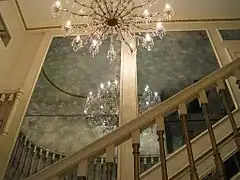 Graceland stairwell
Graceland stairwell Graceland dining area
Graceland dining area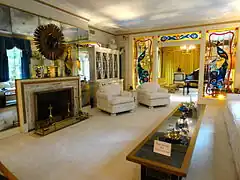 Graceland front room
Graceland front room Graceland music room
Graceland music room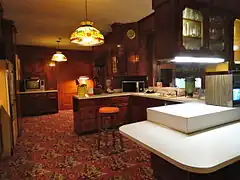 Graceland kitchen
Graceland kitchen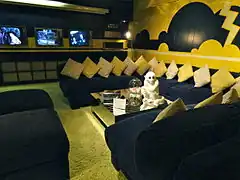 Graceland yellow TV room
Graceland yellow TV room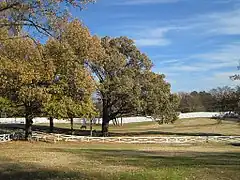 Graceland back yard
Graceland back yard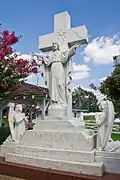 Cross
Cross Graceland fountain
Graceland fountain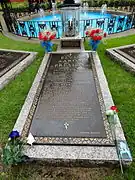 Elvis Presley burial site
Elvis Presley burial site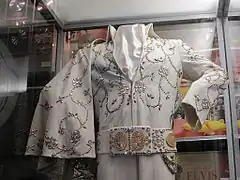 Presley performance outfit
Presley performance outfit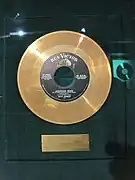 Presley's gold record for "Jailhouse Rock"
Presley's gold record for "Jailhouse Rock"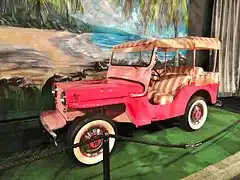 Elvis's Pink Jeep
Elvis's Pink Jeep Floorplan, 1st floor
Floorplan, 1st floor Floorplan, 2nd floor
Floorplan, 2nd floor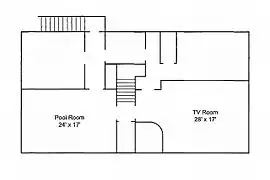 Floorplan, Basement
Floorplan, Basement
See also
- Graceland Too
- List of museums in Tennessee
- List of music museums
- List of National Historic Landmarks in Tennessee
- National Register of Historic Places listings in Shelby County, Tennessee
- Tourism in Memphis, Tennessee, including a special Graceland section, focused on the touristic aspects.
References
Citations
- ↑ Cook, Jody; Henry, Patty (May 27, 2004). "National Historic Landmark Nomination: Graceland" (PDF). National Park Service. Retrieved June 21, 2009. and Accompanying 12 photos, exterior and interior, from 2001 (3.44 MB)
- ↑ West, Carroll Van (1995). Tennessees Historic Landscapes: Travelers Guide. University of Tennessee Press. p. 32. ISBN 978-0-87049-881-7.
- ↑ "National Register Information System". National Register of Historic Places. National Park Service. January 23, 2007.
- ↑ "Graceland". National Historic Landmark summary listing. National Park Service. Archived from the original on December 30, 2011. Retrieved October 4, 2008.
- ↑ Victor 2008, p. 208
- ↑ "Elvis Ancestors Wore Kilts". CBS News. March 25, 2004. Archived from the original on October 2, 2016. Retrieved September 28, 2016.
- ↑ "Riley Keough on Growing Up Presley, Losing Lisa Marie, and Inheriting Graceland". Vanity Fair. August 8, 2023. Retrieved August 11, 2023.
- ↑ Marling, Karal Ann (1996). Graceland: Going Home With Elvis. Harvard University Press. p. 137. ISBN 978-0-674-35889-8.
- ↑ Tucker, Jennifer M. (September 1991). "National Register of Historic Places Registration: Graceland". National Park Service. Retrieved January 19, 2020. With accompanying 41 photos
- 1 2 3 Flippo, Chet (1993). Graceland: Living Legacy of Elvis Presley. Mitchell Beazley. p. 29. ISBN 978-1-85732-255-2.
- 1 2 3 Victor 2008, pp. 205–209
- ↑ "Elvis Presley puts a down payment on Graceland". History. Archived from the original on September 17, 2015. Retrieved January 20, 2015.
- ↑ Buzz Cason, Living the Rock 'N' Roll Dream: The Adventures of Buzz Cason (2004), p.47.
- ↑ Harris, John (March 27, 2006). "Talking about Graceland". The Guardian. Archived from the original on January 13, 2020. Retrieved November 20, 2019.
- ↑ Dundy, Elaine (2004). Elvis and Gladys. pp. 329–330.
- ↑ Miller, Mark Crispin (1988). Boxed In: The Culture of TV. Northwestern University Press. p. 192.
- ↑ Billy Smith interview Part Two." Elvis Information Network Archived February 12, 2015, at the Wayback Machine.
- ↑ See Tracy McVeigh, "Love me tender" Archived February 18, 2021, at the Wayback Machine, The Observer, August 11, 2002.
- ↑ Ballantyne, Andrew (2002). "The Nest and the Pillar of Fire". What Is Architecture?. p. 24.
- ↑ Peter Guralnick, Careless Love: The Unmaking of Elvis Presley (1999), pp. 651-652.
- ↑ Guralnick 1999, pp. 651–53
- ↑ Blanchard, Tamsin (August 11, 2002). Elvis has left the building Archived September 27, 2016, at the Wayback Machine. The Guardian.
- ↑ The Estate of Elvis Presley/The Elvis Presley Trust: EPE History and Structure: All About Elvis Archived March 21, 2008, at the Wayback Machine
- ↑ Bauerlein, Valerie | Photographs by Andrea Morales for The Wall Street (April 7, 2019). "Memphis Offers to Pay to Keep Graceland". The Wall Street Journal. ISSN 0099-9660. Archived from the original on February 18, 2021. Retrieved December 9, 2020.
- ↑ "Memphis council backs part of Graceland expansion plan". CTVNews. July 3, 2019. Archived from the original on February 18, 2021. Retrieved December 9, 2020.
- ↑ Elevation and capital detail in Stuart, The Antiquities of Athens, London 1762.
- ↑ "Elvis Presley's Graceland : 3764 Elvis Presley Boulevard". Elvis Australia. Archived from the original on March 21, 2012. Retrieved January 20, 2015.
- ↑ Moore, June (November 6, 1998). "Graceland Mansion".
- ↑ Ernst Jorgensen, Elvis Presley: A Life in Music – The Complete Recording Sessions (New York: St. Martin's Press, 1998), pp. 394–402
- 1 2 "Graceland Mansion – Graceland Tours – Elvis Presley's Mansion". www.graceland.com. Archived from the original on February 18, 2021. Retrieved June 29, 2017.
- ↑ Guralnick 1999, pp. 651–652
- ↑ Bachor, Ken (2012). "Johnny and Linda Visit the Jungle Room at Graceland – Too Tough to Die: Exclusive Photos From Johnny Ramone's Memoir | SPIN | Music News". SPIN. Archived from the original on March 31, 2012. Retrieved August 11, 2014.
- ↑ Brad Olsen, Sacred Places North America: 108 Destinations, p.281.
- ↑ Albert Goldman, Elvis (New York: McGraw-Hill, 1981), p. 8.
- ↑ Greil Marcus, Dead Elvis: A Chronicle of a Cultural Obsession (Harvard University Press, 1999), p. 71.
- ↑ Karal Ann Marling, Graceland: Going Home With Elvis (Harvard University Press, 1996), pp. 196–197.
- ↑ Daniel Wright, Dear Elvis: Graffiti from Graceland (1996), p.16.
- ↑ Beifuss, John (October 2, 2010). "Benjamin Keough, Elvis' grandson, interred at Graceland". The Commercial Appeal. Retrieved July 20, 2022.
- 1 2 "Lisa Marie Presley leaves behind a lucrative Graceland — and a complicated financial legacy". Los Angeles Times. January 14, 2023. Retrieved January 16, 2023.
- ↑ "Candlelight Vigil 2015". Official Graceland Blog. Archived from the original on February 18, 2021. Retrieved June 17, 2018.
- ↑ "50,000 Elvis fans converge on Graceland for 40th anniversary of his death". WJHL. August 16, 2017. Archived from the original on February 18, 2021. Retrieved June 17, 2018.
- ↑ "Big crowds cause Graceland to change policy on Elvis Presley's candlelight vigil". commercialappeal.com. August 11, 2017. Archived from the original on February 18, 2021. Retrieved June 17, 2018.
- ↑ Davidson, James W.(1985). The pilgrimage to Elvis Presley's Graceland: A study of the meanings of place Archived April 25, 2012, at the Wayback Machine (M.A. thesis) Wilfrid Laurier University
- ↑ See Linda Kay Davidson and David Gitlitz Pilgrimage, from the Ganges to Graceland: an Encyclopedia (Santa Barbara: ABC-CLIO, 2002).
- ↑ "'It's a new era': Graceland unveils Elvis Presley's Memphis". The Commercial Appeal. Archived from the original on March 7, 2017. Retrieved June 29, 2017.
- ↑ "Elvis' Custom-Designed Planes Will Remain at Graceland". Rolling Stone. Archived from the original on August 22, 2017. Retrieved June 29, 2017.
- ↑ "About – Elvis Presley's Graceland and Elvis Presley Enterprises". www.graceland.com. Archived from the original on October 18, 2016. Retrieved June 29, 2017.
- ↑ "Prince Albert's Elvis visit". www.femalefirst.co.uk. Archived from the original on April 6, 2011. Retrieved August 7, 2010.
- ↑ Vincent, Alice (May 28, 2013). "Paul McCartney pays respects to Elvis during Graceland visit". The Daily Telegraph. Archived from the original on March 13, 2018. Retrieved August 17, 2013.
- ↑ "Prince William, Prince Harry Visit Graceland to Pay Tribute to Elvis". Elvis Australia. Archived from the original on June 20, 2014. Retrieved June 7, 2014.
- ↑ "Newlywed becomes 20 millionth visitor to Graceland". WREG.com. May 4, 2016. Archived from the original on September 14, 2016. Retrieved June 29, 2017.
Works cited
- Guralnick, Peter (1999). Careless Love: The Unmaking of Elvis Presley. Little, Brown. ISBN 9780316332972.
- Victor, Adam (2008). The Elvis Encyclopedia Hardcover. Gerald Duckworth & Co Ltd. ISBN 978-0-7156-3816-3.
Further reading
- Davidson, Linda Kay and David Gitlitz. Pilgrimage, from the Ganges to Graceland: An Encyclopedia (Santa Barbara: ABC-CLIO, 2002).
- Engel, Matthew. "Still Stuck on Elvis, Fans Exalt the King". The Guardian (London), August 17, 2002, p. 1.
- Marling, Karal Ann. Graceland: Going Home with Elvis. Cambridge: Harvard University Press, 1997.
- Miksanek, Chris. From de Soto to Elvis: A Brief History of Graceland Farm. Bamber Books, 2012.
